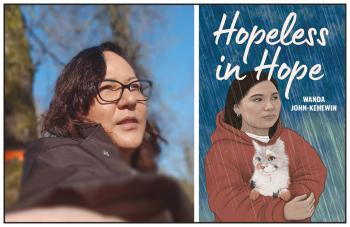Image Caption
Summary
Local Journalism Initiative Reporter
Windspeaker.com
Hopeless in Hope brings together author Wanda John-Kehewin’s experiences as a child in care and as an adult working with the Ministry of Children and Families.
The young adult novel strives to answer the questions John-Kehewin heard children ask over and over again when they were in the same situation she faced as a child and asked those very same questions.
“The story is actually from when I worked for the children’s ministry and I was watching the kids not get answers. Nobody was answering them. Like, ‘Why is my mom not here? Why can I not live with my mom?’ Nobody was really answering them,” said John-Kehewin, a member of the Kehewin First Nation in northern Alberta. She now resides in British Columbia.
“These kids need to know what's going on," for the sake of their mental wellness, said the author. "They need to know about their parents. I never knew if my mom was okay when I was in care or how she was doing. It’s really important to find out.”
It’s the situation that main character Eva Brown, 14, experiences. Eva and her little brother Marcus live with their nohkum (grandmother). Mom Shirley flits in and out of their lives, spending most of her time sleeping off drunken binges in her bedroom.
When Nohkum ends up in hospital, Eva and Marcus are placed in separate foster homes. It is at this time that her grandmother presents young Eva with Shirley’s diary and Eva reluctantly delves into the world of residential schools and intergenerational trauma.
She learns both from the diary and talks with her grandmother in the hospital that Nohkum went to residential school and, when Shirley was still a young child, had abandoned her.
John-Kehewin believes that today, unlike when she was growing up, more children are aware of residential schools and their impact.
And while sharing Shirley’s diary with Eva starts to loosen the anger that often overwhelms the young girl, John-Kehewin isn’t saying that grandparents and parents must share all the darkness from that time with young children.
“There's always a right time. I definitely wouldn't do it if I was unhealed from the trauma. Like, just delve right into it. If I'm on the other side of it and I can understand it, I can explain to my kids (that) this happened to me when I was younger,” she said.
John-Kehewin is an intergenerational trauma survivor. One reason she shared her experiences with her children is because she didn’t want them to be “in the dark about anything.”
As a youngster, John-Kehewin learned all the negative stereotypes associated with Indigenous peoples. She believed them, too, with her mom an alcoholic and her uncle in jail.
“I just did not want to be seen as an Indigenous person, because everything I had learned and heard of the ‘savages’… and with all my experience, who was I to denounce that or deny it?” she said.
But the more Eva reads her mother’s diary, the more she comes to understand the trauma that ruled Shirley’s life. Eva gradually connects with her mother through visitations. Eva’s foster mother provides much needed support and the childcare facilitation panel allows Eva to have a say in being in her mother’s care.
In the end, Eva and Marcus go home and Shirley takes on the parenting role.
It’s the way a young adult book should end, says John-Kehewin, with Eva being happy.
“Because it's possible to be happy with things where they're supposed to be. I’ve got to leave the adult thing to the adults and (let Eva) just be a child right now. That's why I showed Shirley, the mom, taking on more responsibilities as a parent,” said John-Kehewin.
Does Shirley drink again?
“I feel probably yes, and that's why it was important to put that term of ‘relapse’ in there because relapse is part of recovery,” said John-Kehewin, and that’s something important for kids to understand. Mom isn’t drinking again because the child has done something wrong.
“I wish I had understood what the heck was going on when I was a kid. It just seemed to repeat itself,” she said.
“There's no good way to remove a child, but there's a good way to explain to the child, no matter the age, and to give them tools,” said John-Kehewin.
“If nobody takes the time to explain to them, then you know, there's a lot of hurt and pain there…that could have been resolved earlier, that could have been explained earlier. That could have helped the child instead of carrying it.”
John-Kehewin intends for Hopeless in Hope to answer some of those questions that children ask.
John-Kehewin is a poet and also author of a graphic novel, Dreams: Visions of the Crow, released earlier this year. See our story here: https://windspeaker.com/news/windspeaker-news/graphic-novel-tells-story-spiritual-journey-cree-metis-teen
Hopeless in Hope is published by HighWater Press and can be purchased online including at https://www.portageandmainpress.com/cart/en/quick-order
Local Journalism Initiative Reporters are supported by a financial contribution made by the Government of Canada.

